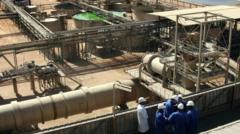In a statement, the junta emphasized that the nationalization is geared towards better governance and more sustainable exploitation of Niger’s mining resources, allowing citizens to optimally benefit from the country’s wealth. Orano, which owns a 63% stake in Somaïr, has yet to publicly respond to this announcement, although reports indicate that the company has already initiated legal proceedings against Niger following the military's intervention last year that took operational control of the firm.
The historical context surrounding this dispute is rooted in Niger's independence from France in 1960, where various agreements were made to ensure that France retained exclusive rights to its uranium supply. Analysts suggest that the population perceives this ongoing relationship as a sign of colonialism, fueling nationalistic sentiments. Despite the desire for greater control over its resources, experts caution that this uncertainty may jeopardize local employment and impact export revenue.
In light of these developments, Niger's stance on foreign exploitation of its natural resources continues to unfold, reflecting a broader trend of shifting alliances and power dynamics in West Africa.
The historical context surrounding this dispute is rooted in Niger's independence from France in 1960, where various agreements were made to ensure that France retained exclusive rights to its uranium supply. Analysts suggest that the population perceives this ongoing relationship as a sign of colonialism, fueling nationalistic sentiments. Despite the desire for greater control over its resources, experts caution that this uncertainty may jeopardize local employment and impact export revenue.
In light of these developments, Niger's stance on foreign exploitation of its natural resources continues to unfold, reflecting a broader trend of shifting alliances and power dynamics in West Africa.


















